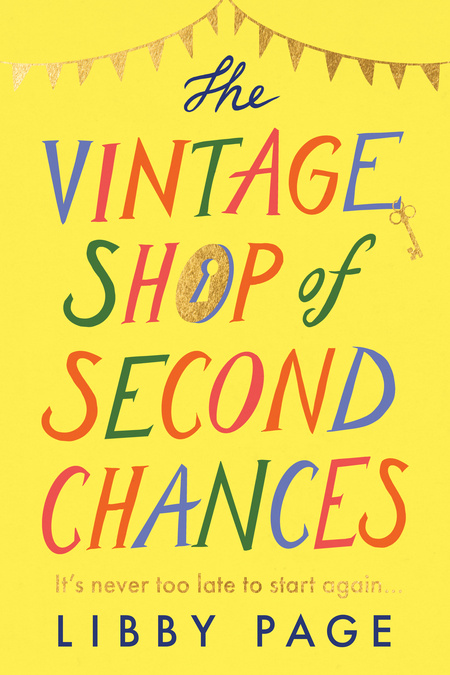There are a great many times in life when things feel so limited and finite, and defiantly, unhealingly one way.
No matter how much we yearn for a something new to life us from a too well-carved rut or for life to bring us meaningful connection or for closure to take us away from the sullying sense that trauma has us in its past tense grip and has no intention of letting us go, second chances elude us and we have to conclude that what we have is all we are ever going to have.
But Libby Page, author of uplifting reads such as The Lido, The 24-Hour Café and The Island Home, is back to remind with real empathy and fulsome understanding in The Vintage Shop of Second Chances, that life doesn’t have to remain mired in stultifying lockstep with the ghosts of what might have been, and often what still sadly remains.
In this heartwarmingly reassuring novel, real life does rear its decidedly ugly and painful head.
Lou, who has just opened a shop selling vintage clothes and accessories at the top of the hill in Frome, Somerset’s main street, already home to a thriving independent retailing scene, is still grieving the recent loss of her mother, a mother who imbued in her a love of yesteryear clothing and of a simpler age when style and elegance seemed to be part of every day fare.
Blinking quickly, she [Lou] looks away from the photographs and back around her shop. It still makes her proud to think that it’s really hers. It’s exactly how she pictured it when she used to daydream in her old office job, right down to the colour of the walls and the carefully handwritten tags that hung from each item. She worked hard to get to this point, spending long days and nights doing DIY and decorating and sorting all her stock. Now everything about it is perfect. All she needs is customers.
This new store is no whimsical jaunt into a long-held dream.
Lou has a lot riding on this, and while being surrounded by and selling vintage goods of the fashionable kind is the realisation of her dream, there’s no guarantee it will work, its very existence both a joy and a threat to the idea that you can strike and try something new, even in the much-mourned ashes of the old.
But Lou wants it to work, and while it’s all riding on her thirty-something shoulders, she’s determined to do what she can to live out her mother’s encouragement to make the most of her life.
At first she does it alone, but when someone suggests she go and board with recently-divorced and rudderless Maggy, a 71-year-old mother and grandmother who once led a grander and much more colourful life, Lou begins to form a lovely found family of women, including many fellow, endlessly supportive retailers, who make her solo journey of renewal one of community and belonging instead.
It’s a glorious journey that Page brings alive with a cosy rawness where the grim realities of death and divorce and dreams set aside or outright sundered, are ever present and never easily dismissed, but where it is possible to not only think about bringing renewal and regrowth but to make it happen.
That’s the sheer joy of The Vintage Shop of Second Chances.
It celebrates how wondrously good and possible it is to step out from your pain and loss, from your trauma, from your just revealed family secret – update New Yorker Donna has just found out life-upsetting news from her mother which has called into question everything she knew, and the only way to deal with it lies in Lou’s shop all the way over in England – and to find healing of the gloriously immersive kind.
These three disparate women – Lou, Maggy and Donna – end up finding out they have far more in common than they don’t, and together they form a unique bond that reminds us all of the emotionally muscular power of friendship and how second chances don’t have to be pipe dreams that never really go anywhere.
Sure, there are a great many elements in The Vintage Shop of Second Chances that feel calmingly and comfortingly fairytale-ish (and deliberately – the genre of second chances is designed to uplift and encourage which is why readers love it so much); life is not usually so malleable or kind as Page suggests it can be but if you dismiss her novels because of that, you are completely missing the point.
We need to hear the message that life can be better, can be free of the pain of the past or the loss of the present and that the future can be good and wonderful and alive with rich, rewarding possibility.
It may not quite work out as it does the bountifully alive women of The Vintage Shop of Second Chances but that doesn’t mean we don’t need to hear that life can come alive again, with shouts of hope and the vitality of new connection, that we can lift ourselves out from the mired isolation of life fallen into a sad and lonely ditch.
Donna takes a sip of her wine and realises she feels relaxed, something she hadn’t imagined she could feel when she boarded the plane alone in New York, riddled with anxiety. Maybe after this trip and all its surprises, she might clean her office on a Friday occasionally instead of a Sunday. And go into the city to visit her daughter and granddaughter more often. And perhaps go on a cruise with her husband. Because if she can come to England by herself and find a cousin she never knew she had and make a new friend too, maybe it’s possible to live a different kind of life after all.
The thing about Page’s heartwarmingly beautiful books, which you embrace with the alluringly true idea that community is everything, is that they don’t shirk away from how awful life can be.
You could hardly argue that either Lou, Maggy or Donna have been left untouched by the cruel vicissitudes of life, and Page is at great pains to emphasis how hurt they have been by these damaging twists and turns of being alive BUT, and this is crucial, she’s also the chief cheerleader of the seductive idea that that doesn’t have to be the end of the story.
All three women, for whom their new friendship and the hope and possibility it brings means the absolute, life redefining world, have to some extent or another, or they do throughout the book anyway, decided that they have reached the end of the journey.
They don’t admit that as such and nor do they eschew the idea of hope springing eternal because who can really bring themselves to do that, and indeed Lou’s shop opening shows that even those down in the depths of grief can see a way forward when none readily appears.
But they are lost, yes, even Lou, and it takes the bonds of community, love and friendship borne of unconditional love to help them find themselves again, to get going on life again and to remake their worlds in ways that enrich us and cheer us up just by being in close proximity.
The Vintage Shop of Second Chances is a blissfully alive piece of second chance writing that celebrates how good it is to know others, really know them, full of sparklingly alive characters, a plot that is both vivaciously possible and gloriously tangible, and a story that unites three wholly different women, and the community around them, and takes them to a place where life can begin again and indeed it does in ways that make the heart glad to read about and to dream of it happening for you too.

